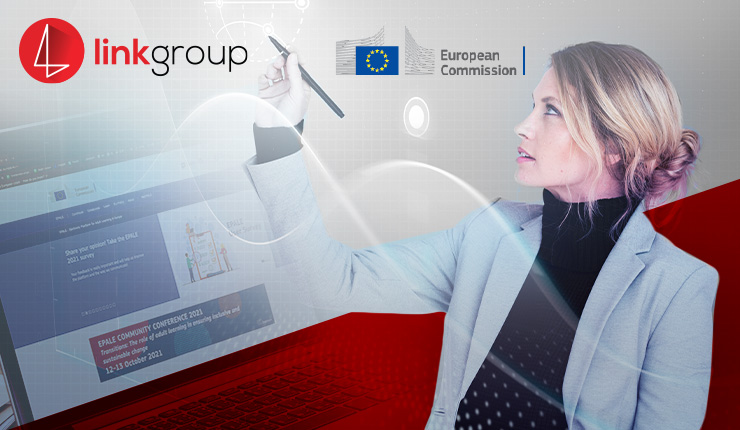LINKgroup at the EPALE Community conference: One step forward towards adult learning
As the trailblazer in the field of contemporary and innovative education in the region, LINKgroup always strives to follow and actively participate in events regarding the progress of educators and all people who care for progressive education. We proudly highlight that LINKgroup took part and followed the EPALE Community annual conference, held on 12 and 13 October 2021, and thus in another way improved and reinforced its status as a company that continuously follows the most contemporary trends in the area of contemporary education and, owing to its efforts, paves the way towards the knowledge of the future.
EPALE, the Electronic Platform for Adult Learning in Europe, gathered some of the most significant names at its annual conference. This year’s conference gave them a chance to discuss the ways in which adult education and learning can help in the mission of shaping the society by promoting inclusive and sustainable education models.
Being part of EU strategy for promoting better opportunities and educational methods for adults, EPALE has contributed to the gathering of adult education professionals, thus creating an open community consisting of adult educators, trainers, researchers and academics, counselors and policy makers.
Transformation: What can we expect?
Education has drastically changed over the last two years, both digitally and demographically, which further implies the need for action and new solutions within the transition process. While simultaneously exploring forms of transformational processes, this conference provides a unique opportunity for sketching new models, with a special focus on overcoming challenges so that nobody would feel excluded.
The first panel discussion of the conference was opened by Sophia Erikkson Waterschoot, the director of the program called Youth, Education and Erasmus+, founded by European Commission’s Directorate General. She highlighted the importance of inclusive and creative adult education with the aim of establishing strong, sustainable societies. Many eminent educators and policy makers took part in the conference, and they had a discussion on the subject of global perspectives in the context of innovative practice in adult education (figure 1). They all agreed that adults must “unlearn” and “relearn” new trends so as to successfully adapt to digitalization in education. In this transformation process, it is important to develop and maintain standards that would ensure the quality and transparency of the most contemporary education.
The participants of the second panel discussion presented their experience acquired within the EPALE community regarding overcoming obstacles and social inclusion enhanced by learning. The first day of the conference was closed by Otto Scharmer, Senior Lecturer at the MIT Sloan School of Management and co-founder of the Presencing Institute, who presented contemporary education in a different manner, emphasizing the importance of the ways in which we used to learn in the past so that we would be able to shape our future in the best possible way.
The impact of adult education on the community of educators
The second day of the EPALE Community conference was opened with the main speech given by Divina Frau-Meigs, professor of Media and ICT sociology at Université Sorbonne Nouvelle. In her speech she said that media convergence and an in-depth mediatization of society have transformed the existing media ecosystem into the one we have today, which has put digital media into the center of people’s communication lives.
These two panels together brought new opinions on the subject of experience regarding digital activism, democracy, as well as intergenerational cooperation in education. The panelists agreed that the adults in the digital age must learn how to learn, improve their digital literacy, learn how to develop critical thinking, and learn to be aware of the presence of digital media in our everyday lives.
Manuela Geleng, jobs and skills director at the Directorate-General for Employment, Social Affairs and Inclusion, closed the conference with the message that changes in adult education will change not only them, but also children and youth, who will enjoy all the benefits of a society in which education is developed.
LINKgroup and the Institute for Contemporary Education are pushing the boundaries of modern education
What is crucial for society development is making sure that one never stops following trends and innovations in education so as to successfully keep up with the standards according to which a new labor market is formed, demanding the most contemporary skills and competencies. For more than 20 years LINKgroup has been the leader in the most contemporary adult education in the field of information technology application. By striving to change the education through replacement of obsolete standards and methods by the education of the future, the goal of LINKgroup is to apply unique learning methods combined with state-of-the-art technology, and thus contribute to the creation of a professional cadre of the new digital age.
LINKgroup also comprises the Institute for Contemporary Education (ICE), whose mission is to educate current and further employees in the field of modern educational technology application and, in this manner, they wish to improve the educational process quality. Within its operations, ICE gathers regional leaders in education who have the ambition to improve themselves in accordance with the global standards of education and thus contribute to the formation of a community that learns in accordance with the requirements of the future.
We deeply believe in LINKgroup’s mission which insists that high-quality education can build a better path, which will be taken by our contemporaries and future leaders from generations that are yet to come.



Leave a comment